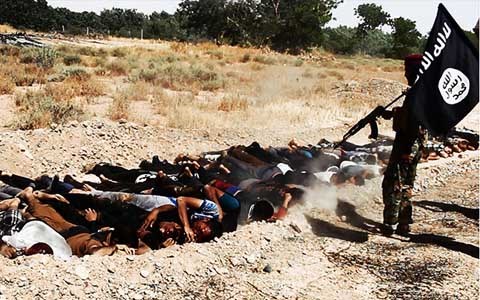Though the anti-IS military operation of the international coalition led by the US has been implemented proactively and extensively in Iraq and Syria, the aim of destroying IS in short time seems to be impossible. According to international analysts, IS still exists and continues to be a serious threat to peace and stability in the Middle East and the world as whole.
 |
|
IS fighter conducting massacre in Iraq (Photo: Reuters) |
For the Middle East, IS has become a horror and significantly changed the geo-political balance. Their territorial occupation and civil massacre force regional and world powers to adjust their policies. For instance, to deal with the IS, Iran, Arab Saudi, Greece, etc have to adjust their relationship with the US and grant the White House a central role in the region. Moreover, IS activities also deepen tension between the Kurd (in northern Iraq and Turkey) and the Shiite Islamic… making the war between political fractions in the Middle East even more complicated. In addition, the existence of IS lengthens the military operation of the international coalition led by the US. It not only inflicts damage on each country but also increases the risk of military intervention in the region. This will cause inequality, poverty, environmental devastation and the rise of extremism and violence. Besides, IS is also a nightmare of violent attack to civilians; severely violates human rights, particularly the right to life, the right to be treated humanely, the freedom of religion and belief, children’s and women’s rights, and the rights of minority groups, etc.
The existence of IS and their brutal terrorist actions also cause profound risks to many other countries globally, especially those with citizens joining it. It is reported that in IS training camps along the border between Syria and Turkey, thousands of foreign fighters are being trained in military skills and filled with violent religious belief before being sent back to their home country to conduct terrorist attacks. Currently, IS has been employing fighters between 15 to 17 of age from all over the world for their combat actions in Syria. The majority of these comes from Europe, America, Australia, etc. These youths have neither criminal record nor opposed action to their society, but they want to earn high income and affirm themselves. Several of them fight for what is called religious duties to protect Islamic from the attack of “Western civilization”. Recently, IS attacks in Europe have deepened the political division within the continent. Especially, the simultaneous attacks in three different countries, namely Tunisia, Iraq, France in the late of June 2015 made people think that IS can bring terror to anywhere at anytime.
Extreme Islam also appears in other parts of the world, including Southeast Asia, driving thousands of Islamic youths, though born and grown up thousands of miles away from Middle East, toward IS. Recently, the governments of Malaysia, Philippines and Singapore discovered channels for financial donation and recruitment of fighters for IS. IS has spreaded to China, causing it a victim of extreme Islamic movements, particularly the Islamic groups of Uyghur.
In conclusion, IS threatens not only the Middle East but also the world with extreme and unprecedented means of action. Therefore, addressing this urgent matter is the responsibility of not only the Middle East but also international community in order to bring about peace and higher living standard for civilians. Though the operation of international coalition led by the US has gained some achievements, it has not helped settle the most fundamental problems. It can’t be prolonged and is not the only effective mean to eradicate the root of extremism. International opinion holds that the rise and rampage of IS are in essence the crisis and contradictions among Arab countries. This crisis must be solved by the Arab themselves in the direction of solidarity, national, religious and fractional reconciliation to enjoy peace together. Besides, it is necessary to have a join effort of countries, nations and religious communities all over the world to condemn, combat, and eradicate extremism and violence whenever and wherever they are. Only by doing so, can the extremism and terrorism be restrained in each particular country and globally.
Major General, Doctor Nguyen Hong Quan
Vice Director of the Institute of Defence Strategy – Ministry of National Defence.